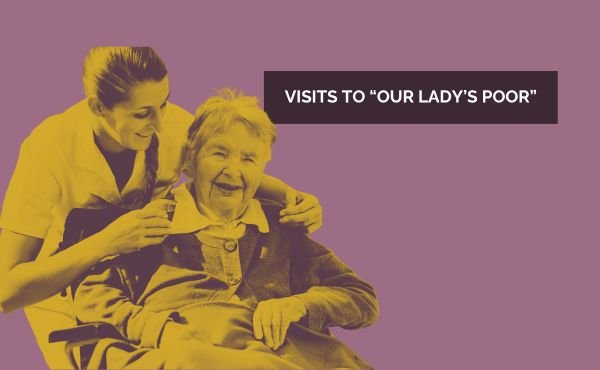Pope Francis Message for World Day of the Poor, 19 November 2023
When St. Josemaría was barely thirty years old, sensing within himself an incessant and growing need to bring to every soul and to the whole world what God had made him see, he had to look for the foundations for this Work of God. Where was he to find them?
If the ends were to be supernatural, he thought, the means must also be supernatural. Prayer, suffering offered to God as prayer... These would be the basis, the solid foundation, of Opus Dei.
“I went to look for strength in the poorest districts of Madrid. Hours and hours in all directions, every day, on foot from one place to another, among people who had come down in the world and people who were completely destitute; children with runny noses, filthy, but children nevertheless, which means souls that are pleasing to God.”[1]
He asked all those whom he cared for spiritually and whom he helped with their material needs, to offer their sorrows, their loneliness, for the work he was doing with young people. He would ask a sick person, a homeless person, a beggar, a dying person wounded in a fight, and in so many other situations.
Origin of the visits to Our Lady’s poor
St. Josemaría had been carrying out these visits to the sick in the hospitals of Madrid since 1927, accompanied by some young people. They would be the precedent for the beginning of the work of Saint Raphael, which is the apostolate carried out by the faithful of Opus Dei with young people. The visits began to take place in 1931, in Madrid, and St. Josemaria began to call them visits to Our Lady’s poor. He considered it a traditional means of St. Raphael’s work that should never be lacking.[2]
With the passage of time, the visits to Our Lady’s poor have been enriched and today they take various forms. But some elements will always be present, such as comforting the poor and the sick,[3] providing some service, accompanying those who are lonely and enabling them to enjoy a pleasant time,[4] etc.
Purpose of the visits to the poor
Our Lord uses these works of mercy to stir up prayer both in our own soul and that of a friend. The conversations that take place also encourage our friend to want to be more generous and to draw closer to God. For example, Blessed Alvaro, who accompanied St. Josemaría on various occasions, said in this regard: “Contact with poverty, with abandonment, produces an enormous spiritual shock. It makes us see that we often worry about silly things that are nothing more than our own selfishness, our own pettiness."[5]
Pope Francis asks: “How can I find the wounds of Jesus today? I cannot see them as Thomas saw them. I find the wounds of Jesus by doing works of mercy.”[6]
In fact, it is Jesus himself who tells us this: “Truly I tell you, whatever you did to one of the least of these my brethren, you did it to me.”[7] This is why St. Josemaría, like so many other saints, was convinced that through visits to the poor they “learn, in a practical way, to see Jesus in the poor, the sick, the weak, the lonely, the suffering, and in children.”[8]
Through visits to the poor, young people learn to practice charity; they learn to feel solidarity with the needs of others and they discover in a very practical way that love for God and love for neighbor are inseparable.[9]
Visits to the poor are also a school of affection and charity in any circumstance, be it family or work-related. If we learn to find Christ in each person we visit, we will find it easier to transfer this to our daily life so as to see Christ in others at every moment.
In addition to being a means to attain human and Christian maturity, this practice meets a need in all countries. Even in countries where there is greater economic development, there are people in need, people who are sick or on their own.
Whenever possible, these visits are organized on feast days of Our Lady, since one of the aims is precisely to honor Mary in her poor. In Opus Dei, from the beginning, we have always followed this path of bringing young people into contact with the most needy people in society, so as to bring them relief and consolation.
A more detailed explanation of the visits to the poor, can be found in “The Collected Letters – Volume 2” of St. Josemaría Escrivá, Letter 7, dated 24 October 1942, nos. 41-44.
[1] St. Josemaría, In Dialogue with the Lord, no. 115.
[2] St. Josemaría, Letter, 24 October 1942, no. 45.
[3] Ibid, no. 41.
[4] Ibid.
[5] Blessed Álvaro del Portillo, family get-together, 4 March 1988; qtd. in Javier Medina, Álvaro del Portillo, Rialp, Madrid 2012, p. 78.
[6] Pope Francis, Homily, 3 July 2013.
[7] Mt 25:34-40.
[8] St. Josemaría, Letter, 24 October 1942, no. 42.
[9] Cf. 1 Jn 4:20-21.
